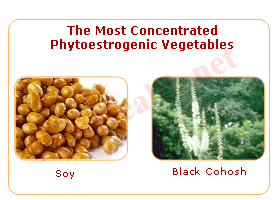A team of researchers from the University of Pennsylvania made a review of all the scientific literature in English of the last 30 years about phytoestrogens to verify if these plant-estrogen compounds can be used as a successful alternative to Estrogen Replacement Therapy (ERT).

After reading more than 1000 articles, researchers, studies etc, they found several conclusions. First off, they consider that ERT has been used for more than 25 years with great effectiveness. Several researches show that ERT can be used to prevent cardiovascular diseases, to reduce osteoporosis risk and to relieve menopausal symptoms.
However, ERT also has side effects include a potential increase in the risk of breast cancer and an increase in vaginal bleeding. As well, there is an increased risk of endometrial cancer if women with an intact uterus take unbalanced estrogen therapy.
It is claimed that these supplements can lower cholesterol levels, reduce menopausal symptoms, decrease the risk of endometrial cancer, improve sexual enjoyment, and reduce the risk of osteoporosis. Increasing the intake of phytoestrogens is also thought to decrease the risk of cancer and cardiovascular disease.
Either way, consumer interest has increased quickly on alternative medicine, particularly in the use of phytoestrogenic herbs for menopausal symptoms relief, such as hot flashes. Many women who are unwilling to take traditional ERT see herbal therapies as natural and, therefore, preferable to "unnatural" prescription medication, despite the fact that traditional ERT is often derived from natural sources such as mare's urine. Herbal and plant-derived therapies are frequently considered safer, although there are no government standards controlling their quality. While herbal supplements may be effective, they may also be dangerous, mixed with contaminants, or have unknown or adverse effects.
Herbs traditionally recommended for menopausal symptoms include black and blue cohosh, red clover, ginkgo biloba, evening primrose oil, chasteberry among others. Concentrated phytoestrogens are available in pill form and are sold extensively in health food stores and on the Internet. Web sites attest to the fact that these supplements are natural, identical to human hormones, and as effective as prescription ERT. The metabolism of the phytoestrogens varies from person to person, and there is also a sex difference, with women appearing to metabolize them more efficiently. The estrogenic activity of the various isoflavones varies greatly, and medical researchers do not yet know.
It is clear that scientific evidence regarding the safety and efficacy of phytoestrogens is very scant. Very few randomized controlled trials have been done investigating their use and these trials show that none have proved better than placebo. Indeed, clinically proven health benefits of prescribed ERT far outweigh those of phytoestrogens. Therefore, there is insufficient evidence to recommend the use of phytoestrogens in place of traditional ERT, or to make recommendations to women about specific phytoestrogen products.